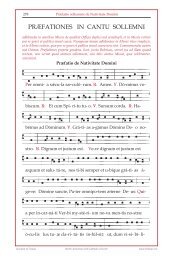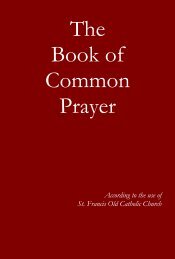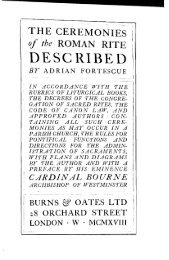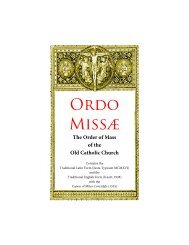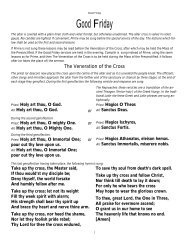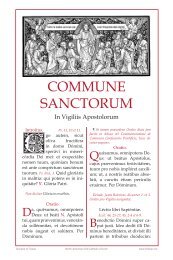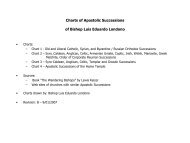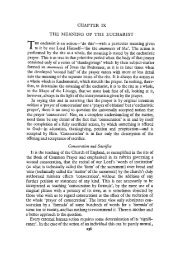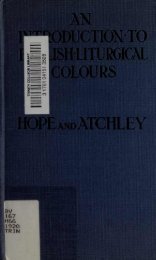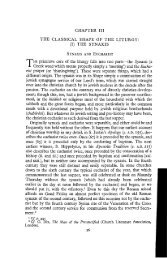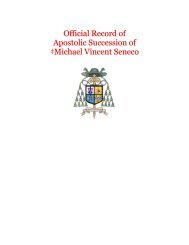Eucharist and Lord's Supper
Eucharist and Lord's Supper
Eucharist and Lord's Supper
Create successful ePaper yourself
Turn your PDF publications into a flip-book with our unique Google optimized e-Paper software.
7° THE SHAPE OF THE LITURGY<br />
words of our Lord Himself have ever established such an idea in the filce<br />
of the persisting inhibitions exemplifiedin Acts x. 14;xi. 8; xv. 29; etc.?<br />
The Jerusalem church displayed many of the conservative virtues. But<br />
those who like to think that that old bottle actually generated the new wine<br />
will find little encouragement in the somewhat questioning reception it<br />
offered to new ideas when they were put before it by SS. Peter <strong>and</strong> Paul.<br />
The Meaning ofthe Last <strong>Supper</strong><br />
The 'liberal' investigation of the New Testament conducted during<br />
the last two generations with such immense thoroughness <strong>and</strong> ingenuity<br />
usually found itself arriving at the disconcerting conclusion that on every<br />
point of importance the primitive church was more vitally creative for the<br />
future history of christianity than was Jesus of Nazareth Himself. It is the<br />
irrationality of such results which more than anything else has brought<br />
about the various contemporary revolts against the whole liberal outlook<br />
in theology. These are directed not so much against its methods, which are<br />
being superseded rather than discarded, as against its basic assumptions<br />
<strong>and</strong> the conclusions to which they inevitably led; for it is now plain that<br />
despite all the deference to critical methods which liberal scholars sincerely<br />
endeavoured to pay, their conclusions were as often dictated by their presuppositions<br />
as by their actual h<strong>and</strong>ling of the evidence.<br />
So in this case. The liberal thesis about the origins of the christian eucharist<br />
was that it had little or no direct connection with the last supper of<br />
Jesus, Who if He did then perform any symbolic action <strong>and</strong> utter any symbolic<br />
words in connection with bread (<strong>and</strong> a cup also, which is even more<br />
natural to a Jew, but a step not difficult to imagine in a cosmopolitan community<br />
like the Christian community at Antioch' (p. 19). So it was as easy as that! But<br />
unfortunately there subsist certain difficulties in that case, requiring further 'conjectures'<br />
which are not made by Dr. Hunkin, but which 1 will venture to supply.<br />
Presumably Barnabas, the jewish levite specially sent from Jerusalem to take charge<br />
of the Antiochene church (Acts xi. 22), warned his assistant Saul of Tarsus 'They<br />
may not like this very much at Jerusalem'. But S. Paul, who though 'of the straitest<br />
sect of the pharisees' did not share this jewish prejudice about blood, had got hold<br />
of a cock-<strong>and</strong>-bull story about the last supper off the Antiochene gentile converts;<br />
into which story the chabzll'ah customs had been so cunningly worked that it completely<br />
convinced Barnabas that that was how it must have happened; drinking<br />
blood was not really a new idea at all, but what the Jerusalem church had meant all<br />
along. And so when Peter came down to Antioch Barnabas convinced him, too, that<br />
that was really what had happened at the last supper. And when Peter <strong>and</strong> Barnabas<br />
<strong>and</strong> 'all the jews' at Antioch disagreed violently with Paul (Gal. ii. 11-13) actually<br />
about the question of 'table-fellowship' (which involved the eucharist) in that particular<br />
church, they none of them felt any longer that there was anything 'unnatural<br />
to a jew' about this strange idea that S. Paul had taken up with there, <strong>and</strong><br />
did not think of mentioning the matter to him. And it was their silence on this<br />
occasion which led him to tell the Corinthians that he had 'received' the whole<br />
story 'by tradition from the Lord'. (I choose this particular example of liberal<br />
scholarship, not to single it out as exceptional-it seems typical of the methods which<br />
have been pursued in some cases to elucidate the whole question-but because any<br />
reader can easily check the whole matter for himself in this case.)



